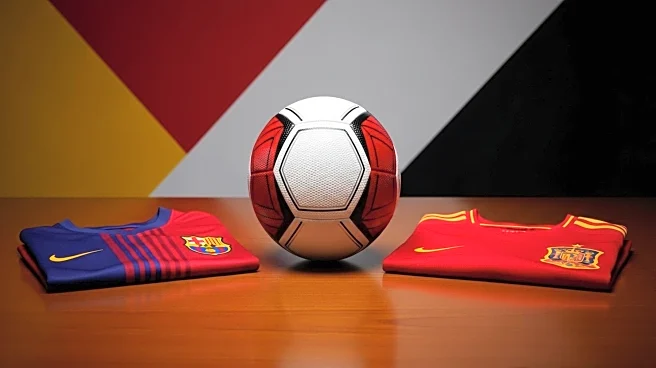What's Happening?
Tensions have escalated between FC Barcelona and the Spanish national team due to recent decisions by Luis de la Fuente, the national team coach. The controversy began with Lamine Yamal, who was recalled for international duty despite an injury, and has now intensified with the situation involving Dani Olmo. Olmo was called up by de la Fuente despite Barcelona reporting a muscular issue. Although Olmo attempted to train, his condition worsened, leading to his absence from the upcoming Clásico and a three-week recovery period. De la Fuente claimed Olmo was in perfect condition, contradicting reports from the Royal Spanish Football Federation (RFEF) that acknowledged signs of muscular fatigue. This has sparked indignation within Barcelona, who accuse de la Fuente of lacking caution and discernment, further straining the relationship between the club and the national team.
Why It's Important?
The strained relationship between FC Barcelona and the Spanish national team could have significant implications for player management and team dynamics. Barcelona's frustration with the national team's handling of player injuries may lead to increased scrutiny and tension in future player selections. This situation highlights the challenges of balancing club and national team interests, particularly regarding player health and availability. The ongoing discord could affect the performance and morale of players involved, potentially impacting their contributions to both their club and the national team. Additionally, this conflict underscores the need for clear communication and cooperation between clubs and national teams to ensure player welfare and optimal performance.
What's Next?
As tensions continue, FC Barcelona may seek to establish clearer protocols and communication channels with the Spanish national team to prevent similar issues in the future. The club might push for more stringent medical assessments and transparency regarding player conditions before national team call-ups. Additionally, the situation could prompt discussions within the RFEF about improving coordination with clubs to safeguard player health. Stakeholders, including other clubs and national teams, may watch closely to see how this situation unfolds, potentially influencing broader practices in player management and international duty.
Beyond the Headlines
This conflict between FC Barcelona and the Spanish national team raises broader questions about the ethical responsibilities of national teams in managing player health. It highlights the potential for long-term impacts on player careers if injuries are not adequately addressed. The situation also reflects the cultural and institutional pressures faced by national team coaches in balancing competitive success with player welfare. As clubs and national teams navigate these challenges, there may be calls for reforms in how player health is prioritized and managed across different levels of competition.











